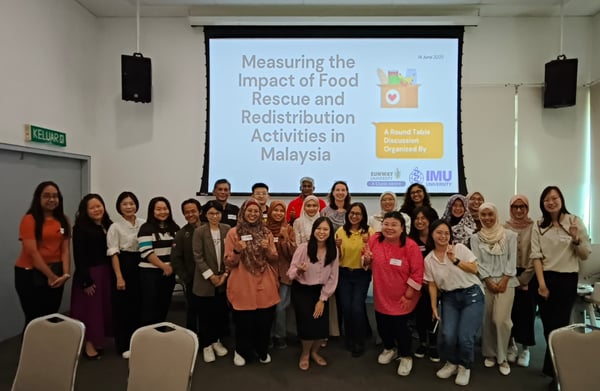ReMeal was honored to be invited to the UK–Malaysia Network for a Healthier Digital Food Environment stakeholder workshop, held at Le Méridien, Putrajaya, on 24 June 2025. This timely gathering brought together forward-thinking minds from the Nutrition Division of the Ministry of Health (MOH), World Health Organization (WHO), MDEC, Foodpanda, Dutch Lady, and other key players to tackle one of Malaysia’s most pressing health challenges: reshaping how we eat in a digital-first era.
This workshop also included researchers from the University of Leeds, University of Nottingham Malaysia, Universiti Putra Malaysia, and Khazanah Research Institute, with generous support from the British Council and Akademi Sains Malaysia.
🧠 The Digital Dilemma: When Convenience Meets Calories
With Malaysia ranking 2nd in ASEAN for overweight and obesity rates, the stakes are high. Our growing reliance on digital food platforms — while boosting access — has also led to a rise in high-fat, salt, and sugar (HFSS) consumption. Algorithms don’t always have our health in mind.
At ReMeal, we believe food access should come hand-in-hand with food responsibility.
🎯 Reimagining Food Delivery Platforms: Nudges Toward Healthier Habits
Could our food apps become allies in promoting healthier lifestyles? Imagine:
Smart Health Tracking: Offering users insights into their food choices over time — visible calorie and nutrient summaries.
Healthy Rewards Program: Coupons, free delivery, or points for choosing meals with the Healthier Choice Logo (HCL).
Custom Filters: Allow users to filter by "Low Sugar," "High Fiber," or “Nutri-Grade A/B” meals.
Push Notifications for Good: Instead of promoting bubble tea at 10pm, prompt users with hydrating, low-sugar alternatives.
These subtle but powerful features could guide users toward better decisions — without removing choice.
📱 Healthy Influences: Social Media and Advertising Responsibility
MOH's collaboration with MCMC could be a game-changer. By curbing advertisements of HFSS foods — especially those targeted at children — we protect the most impressionable from becoming lifelong junk food consumers. ReMeal strongly supports this initiative and invites influencers to champion nutritious food trends.
🧾 Policy in Motion: Taxation, Transparency & Nutri-Grades
As MOH gears up to implement a Nutri-Grade system by 2026 (beginning with packaged drinks, then expanding to cafés and restaurants), transparency will be key. Products rated Grade D will be barred from all advertising — raising the bar for food producers. Meanwhile, extending the sugar tax to include condensed milk, sweetened creamers, and cordial drinks is a bold step toward the WHO’s recommended 20% threshold.
At ReMeal, we support policies that empower — not restrict — consumers through informed choice.
🏫 Feeding the Future: Healthy Central Kitchens for Schools
Instilling healthy habits starts early. MOH’s Healthy Central Kitchen (HCK) model — both offsite (type 1) and onsite (type 2) — promises more nutritious, consistent school meals. Whether operated from central commercial units or enhanced TASKA facilities, the goal remains the same: fuel learning with real food, not ultra-processed fillers.
🔄 The Double-Edged Sword of Digitalization
Digital tech holds immense potential in the supply chain: enhancing traceability, resilience, and efficiency. But it must be wielded wisely. In some cases, digital tools have fueled aggressive farming practices that chase yield at the cost of nutrition and farmer autonomy.
Let’s ensure digital transformation works for people and for the planet.
🌍 A Global Glimpse: What We Can Learn from South Korea
Digital innovation isn't just about food access — it’s also about food waste. South Korea once recycled only 2% of food waste. Today? They’ve hit an astounding 95%, thanks to RFID technology that tracks and reduces waste in real time.
Could Malaysia follow suit? ReMeal believes so — with the right tech, public-private collaboration, and unwavering commitment.
💚 At ReMeal, our mission is simple:
Rescue good food, restore dignity, and reimagine a system where every meal counts — for our bodies, communities, and planet.
We’re proud to be part of conversations that don’t just reimagine food systems — but rebuild them for good.






